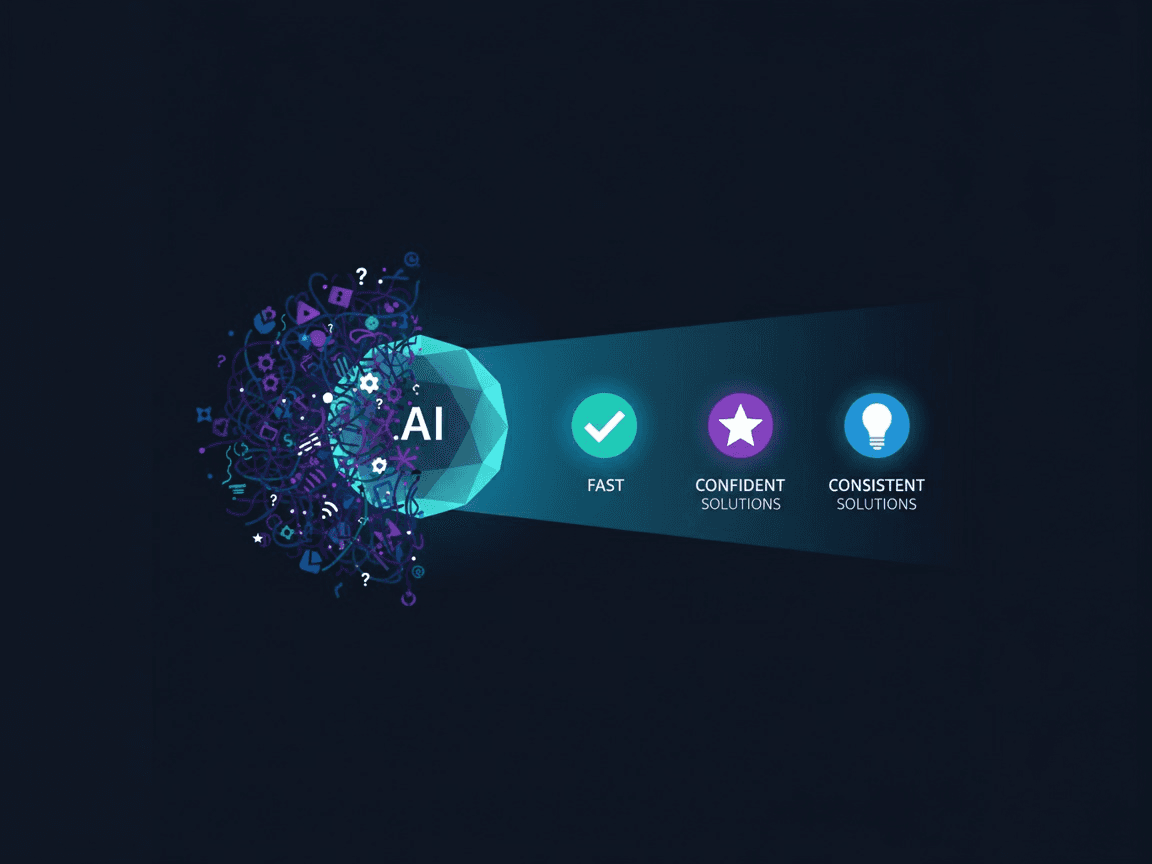An Expert on Every Call: How AI Helps New Support Staff Shine

Your new support agent’s first day is often a trial by fire. They’re facing a mountain of product information and a queue of customers who expect perfect answers, right now.
That long ramp-up period, where they struggle to find the right information, is costly for your business and stressful for them.
But what if you could give every new hire an expert on their shoulder from their very first call? That’s the game-changing power of an AI co-pilot.
This technology is transforming the onboarding process, empowering new staff to handle tough questions with the confidence of a seasoned pro. Let’s explore how it works.

The Challenge for New Support Agents
Think back to your first day at a new job. Now imagine that on day one, you’re put on the front lines, expected to be the face of the company and solve complex problems for impatient customers. That’s the reality for new customer support agents.
It’s a tough gig, to say the least. The learning curve isn’t just steep; it’s a vertical cliff. New agents are thrown into the deep end, armed with a few weeks of training and a mountain of documentation they can’t possibly remember.
The Expectation vs. Reality Gap
Customers don’t care if it’s your first week. When they call, chat, or email, they expect an expert. They want their problem solved quickly and correctly by someone who knows the product inside and out. They don’t want to hear “Um, let me check on that” every thirty seconds.
But the reality for a new agent is a constant state of uncertainty. Every incoming ticket is a potential landmine. Is this a common issue or a rare bug? What’s the right troubleshooting step? Am I allowed to offer a discount for this? The fear of giving the wrong answer is paralyzing.
Juggling Tools and Information
On top of the product knowledge, they have to master a whole new set of tools. The ticketing system, the CRM, the internal knowledge base, the chat platform—it’s a digital juggling act. Finding the right piece of information while a customer is waiting feels like searching for a needle in a haystack, while the haystack is on fire.
This pressure leads to longer resolution times, inconsistent answers, and a lot of escalations to senior staff. More importantly, it leads to burnout for the new hires who are just trying to find their footing.
,
Information Overload: Why It’s Hard to Keep Up
Think about everything a new support agent is expected to know. It’s not just one thing; it’s a mountain of information that’s always growing. From the moment they log in, they’re drinking from a firehose, and it’s a lot to handle.
On any given day, an agent needs to be a master of several domains at once. The sheer volume is staggering, and the sources are all over the place.
The Ever-Expanding Knowledge Universe
First, you have your products or services. This isn’t just a simple list of features. It’s understanding every nuance, every potential bug, every recent update, and how different features interact with each other. When a customer asks, “Why does this button do that when I have this setting enabled?” the agent needs to know the answer, and fast.
Then you have company policies. What’s the refund process? What are the terms of the warranty? Are there different Service Level Agreements (SLAs) for different customer tiers? This information is often buried in dense internal documents, and getting it wrong can create a huge headache for both the customer and the company.
And let’s not forget the tools themselves. Agents have to navigate the CRM, the ticketing system, internal chat tools, and maybe a separate knowledge base. Finding a single piece of information might mean searching across three or four different platforms while the customer waits on the line. It’s a recipe for long silences and flustered agents.
This constant context-switching is mentally exhausting. It’s nearly impossible for anyone, let alone someone new to the role, to hold all of that information in their head and retrieve it instantly. The knowledge isn’t just vast; it’s fragmented and constantly changing, which makes an already tough job even harder.
,
The AI Co-Pilot: An Expert on Their Shoulder
What if every new agent, from their very first day, could have your most seasoned expert sitting next to them, whispering the right answers on every single call? That’s the reality of an AI co-pilot. This isn’t about replacing your human support team with robots. It’s about supercharging them.
Think of an AI co-pilot as a GPS for customer conversations. The agent is always in the driver’s seat, handling the conversation with their own personality and empathy. The AI simply works in the background, providing real-time guidance and suggesting the best route to a successful resolution. It listens to the conversation, understands what the customer needs, and does the heavy lifting of finding the right information.
How It Works in Real-Time
So, what does this actually look like during a live call? Imagine your newest hire is talking to a customer who has a very specific, technical question about a product feature they’ve never heard of. That initial flicker of panic is a familiar feeling for any new agent.
But instead of putting the customer on a long hold while they desperately search a clunky knowledge base, the AI co-pilot is already at work. It transcribes the conversation as it happens, identifies the key question, and instantly surfaces the exact right information on the agent’s screen. This could be a specific troubleshooting guide, a pre-approved response snippet, or a link to the relevant policy page. The answer is just… there. No searching required. It turns that overwhelming mountain of information into a single, perfectly timed suggestion.
,
Benefit 1: Get New Agents Up to Speed, Faster
Think about the traditional onboarding process for a support agent. It’s usually a whirlwind of classroom-style training, shadowing senior team members, and trying to absorb a mountain of information from dense knowledge bases. For weeks, new hires are in a state of learning, not doing. It’s slow, expensive, and can be pretty overwhelming for the new person.
An AI co-pilot completely flips this model on its head.
Learning on the Job, Not Just in the Classroom
Instead of forcing agents to memorize everything before they take their first call, an AI co-pilot acts as a real-time tutor. Imagine a new agent gets a question they’ve never heard before. Without AI, they’d have to put the customer on hold, frantically search the knowledge base, or flag down a supervisor. It’s stressful for them and frustrating for the customer.
With an AI partner, the tool listens to or reads the customer’s query and instantly surfaces the right information. It might be a specific troubleshooting step, a link to the correct help article, or a pre-written response that perfectly answers the question. The new agent doesn’t just get the answer; they learn the process in a live, low-stakes environment. Every interaction becomes a hands-on training session.
This dramatically shortens the ramp-up period. Agents who might have taken a month or more to feel comfortable can become confident, productive members of the team in a fraction of the time. They start successfully resolving tickets from day one, which builds their confidence and makes them feel like a valuable part of the team right away.
,
Benefit 2: Handle Tough Questions with Confidence
We’ve all been there. That moment when a customer throws a curveball question you’ve never heard before. For a new support agent, it’s a moment of pure panic. The silence stretches, your mind goes blank, and the dreaded phrase, “Um, let me put you on a brief hold while I find someone who can help,” is on the tip of your tongue.
This is where an AI co-pilot changes the entire game. It acts as a safety net, transforming moments of panic into opportunities to shine. It’s not about the agent not knowing; it’s about empowering them with the collective knowledge of the entire company, instantly.
From “I Don’t Know” to “I’ve Got It”
Imagine a customer calls in with a hyper-specific technical error code or asks about a compatibility issue with a third-party software your agent has never even heard of. Instead of frantically searching a clunky knowledge base or flagging down a senior team member, the AI co-pilot is already on it.
As the agent listens to the customer’s problem, the AI analyzes the conversation in real-time. It identifies keywords and concepts, then instantly surfaces the exact troubleshooting guide, policy document, or internal note needed to solve the problem. The answer appears discreetly on the agent’s screen before they even have to ask for help. That panicked scramble is replaced by a calm, cool, “I can help you with that.”
Confidence is Contagious
This isn’t just about finding the right answer faster. It’s about the profound psychological impact it has on your new hires. When agents know they have a reliable expert backing them up on every single call, their confidence soars. They feel more capable, less stressed, and more engaged in their work.
And that confidence is something customers can feel. A support interaction with a self-assured agent is completely different from one with someone who sounds uncertain. It builds trust in your brand and leaves the customer feeling like they’ve received truly expert-level support, no matter how new the person on the other end of the line is.
,
Benefit 3: Deliver Perfect, Consistent Answers
Ever played customer support roulette? You contact a company on Monday and get one answer about the return policy. On Tuesday, you talk to someone else and get a completely different story. It’s frustrating, and it kills trust. For new agents, this is an easy trap to fall into. They might misremember a detail or paraphrase a policy in a way that accidentally changes its meaning.
This is where an AI co-pilot becomes your brand’s ultimate guardian. It doesn’t rely on memory; it relies on your company’s single source of truth. Whether it’s a knowledge base, internal documentation, or past approved tickets, the AI pulls from the official playbook every single time.
Nailing the Brand Voice, Every Time
Consistency isn’t just about facts; it’s about feeling. Does your brand have a friendly, casual tone? Or is it more formal and professional? It’s tough for a new hire to master that voice in their first few weeks. An AI assistant, trained on your brand guidelines and best-performing conversations, can generate responses that sound exactly like you. This ensures a customer has the same brand experience whether they’re talking to a seasoned pro or someone on their second day.
Eliminating ‘I Think’ from Your Support Vocabulary
Nothing erodes a customer’s confidence faster than hearing an agent say, “Um, I think the policy is…” An AI co-pilot replaces that uncertainty with facts. It provides agents with the precise wording, the correct steps for a troubleshooting process, or the exact terms of a promotion. This transforms a new agent’s hesitant response into a confident, authoritative answer. They aren’t just guessing; they know, because their expert co-pilot just told them.
,
How to Choose the Right AI Co-Pilot for Your Team
Okay, so the idea of an AI co-pilot sounds pretty great, right? But a quick search reveals a ton of options, and they all promise the world. How do you cut through the noise and find the tool that’s actually right for your team?
It’s not about finding the fanciest tech. It’s about finding the one that fits your workflow like a glove. Here are the key things to look for.
Integration with Your Existing Tools
This is non-negotiable. The last thing you want is another tab for your agents to manage. A great AI co-pilot should live right inside the tools your team already uses every single day. Does it plug directly into your helpdesk like Zendesk, Intercom, or Salesforce Service Cloud? Does it work seamlessly with your chat and email platforms?
If the tool can’t integrate smoothly, it creates friction. And friction is the enemy of efficiency. The goal is to make your agent’s job easier, not to add another complicated step to their process.
Knowledge Source Flexibility
An AI is only as smart as the information it can access. Before you commit, you need to ask: where does this AI get its answers? A powerful co-pilot should be able to connect to all of your scattered knowledge sources. We’re talking about your official knowledge base in Confluence, your shared documents in Google Drive or SharePoint, and even your internal wikis.
Even better, can it learn from past support tickets? The best tools can analyze resolved conversations to find proven solutions that aren’t even in your official documentation yet. The more sources it can learn from, the more comprehensive and accurate its suggestions will be.
Ease of Use for Agents and Admins
If a tool is clunky or confusing, your team just won’t use it. Simple as that. Look for a clean, intuitive interface that feels like a natural part of the agent’s workspace. The suggestions should appear instantly and be easy to understand and use. A demo is essential here—get your agents to try it out!
And don’t forget about the admin side. How easy is it to set up? Can you easily add or remove knowledge sources? Can you track how the tool is being used and how effective it is? A system that’s a nightmare to manage will quickly be abandoned.
Security and Compliance
You’re dealing with customer information, so security has to be a top priority. Don’t be afraid to dig into the technical details. Ask about their security certifications, like SOC 2 or ISO 27001. Understand how they handle data privacy and if they comply with regulations like GDPR or CCPA.
You need to be completely confident that your customer and company data is safe. Any reputable vendor will be transparent about their security practices.
,
The Goal: Better Support and Happier Agents
When we talk about bringing in new technology like AI, it’s easy to get lost in the features and functions. But at the end of the day, what’s the real point? It all comes down to achieving two deeply connected goals: delivering a better experience for your customers and creating a better work environment for your agents.
Implementing an AI co-pilot isn’t just about improving metrics; it’s about fundamentally improving these two core aspects of your business. It’s a true win-win.
Elevating the Customer Experience
Let’s start with the customer. When every single agent, from the seasoned veteran to the rookie who started on Monday, can provide fast, accurate, and consistent answers, the customer experience transforms. Think about it. There are fewer long holds while an agent desperately searches a knowledge base or asks a colleague for help. Customers don’t get conflicting information when they call back and speak to someone else.
This level of service has a direct impact on the things that matter most: Customer Satisfaction (CSAT) scores go up, First Contact Resolution (FCR) rates improve, and brand loyalty strengthens. Customers don’t care if the agent has been on the job for ten years or ten minutes; they just know they got their problem solved quickly and professionally. That’s how you build trust.
Investing in Your Team’s Well-being
Now, let’s look inward at your team. Being a customer support agent, especially when you’re new, can be incredibly stressful. You’re constantly worried about not knowing the answer to a question and letting a customer down. An AI co-pilot is a powerful antidote to that anxiety.
It acts as a safety net, giving agents the confidence to tackle any issue that comes their way. That constant “what if” fear is replaced by a sense of empowerment. They know they have a reliable expert right there with them on every single call or chat. This boost in confidence is a game-changer for morale, turning a high-stress role into a more manageable and rewarding one.
And when your agents are happier and less stressed, they perform better and they stay longer. Reducing agent churn is one of the biggest challenges in the support world, and providing tools that make the job easier is a huge step in the right direction. A supported, confident team is the foundation for outstanding customer service.
Conclusion
AI co-pilots are no longer a futuristic concept; they are a practical tool transforming support teams today.
Gone are the days of long, stressful ramp-up periods. New hires can now step into their roles with the confidence of a veteran, armed with instant, accurate answers for every customer query.
This means faster resolutions for your customers and more empowered employees from their very first day.
By putting an expert on every call, you aren’t just improving onboarding metrics. You are building a smarter, more resilient foundation for your entire support operation, ensuring every customer interaction is a great one.



